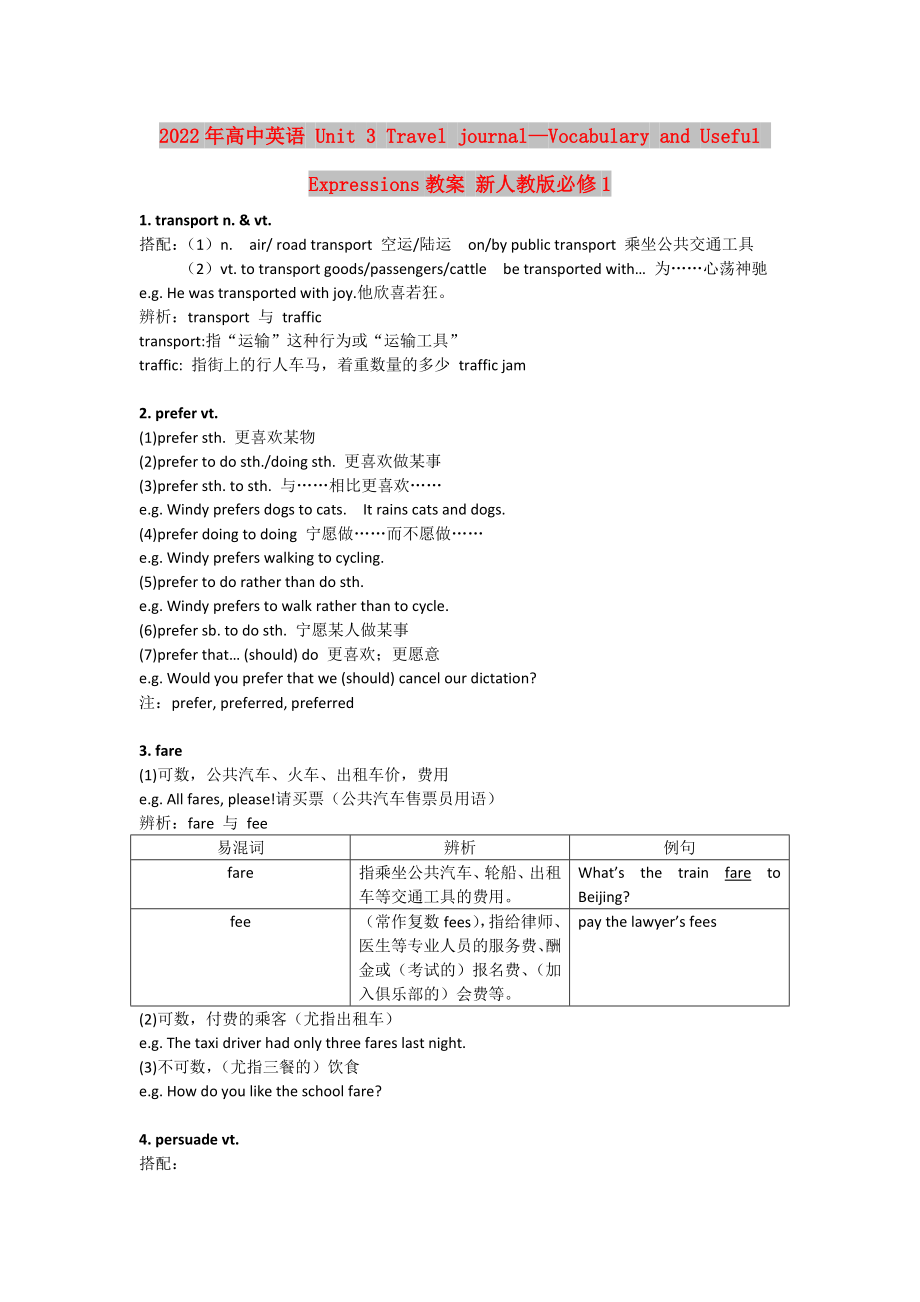《2022年高中英語 Unit 3 Travel journal—Vocabulary and Useful Expressions教案 新人教版必修1》由會員分享�����,可在線閱讀��,更多相關(guān)《2022年高中英語 Unit 3 Travel journal—Vocabulary and Useful Expressions教案 新人教版必修1(5頁珍藏版)》請在裝配圖網(wǎng)上搜索�����。
1、2022年高中英語 Unit 3 Travel journal—Vocabulary and Useful Expressions教案 新人教版必修1
1. transport n. & vt.
搭配:(1)n. air/ road transport 空運/陸運 on/by public transport 乘坐公共交通工具
(2)vt. to transport goods/passengers/cattle be transported with… 為……心蕩神馳
e.g. He was transported with joy.他欣喜若狂�。
辨析:transp
2、ort 與 traffic
transport:指“運輸”這種行為或“運輸工具”
traffic: 指街上的行人車馬����,著重數(shù)量的多少 traffic jam
2. prefer vt.
(1)prefer sth. 更喜歡某物
(2)prefer to do sth./doing sth. 更喜歡做某事
(3)prefer sth. to sth. 與……相比更喜歡……
e.g. Windy prefers dogs to cats. It rains cats and dogs.
(4)prefer doing to doing 寧愿做……而不愿做……
e.g. Wi
3、ndy prefers walking to cycling.
(5)prefer to do rather than do sth.
e.g. Windy prefers to walk rather than to cycle.
(6)prefer sb. to do sth. 寧愿某人做某事
(7)prefer that… (should) do 更喜歡���;更愿意
e.g. Would you prefer that we (should) cancel our dictation?
注:prefer, preferred, preferred
3. fare
(1)
4����、可數(shù)�����,公共汽車����、火車、出租車價��,費用
e.g. All fares, please!請買票(公共汽車售票員用語)
辨析:fare 與 fee
易混詞
辨析
例句
fare
指乘坐公共汽車、輪船����、出租車等交通工具的費用���。
What’s the train fare to Beijing?
fee
(常作復(fù)數(shù)fees)�,指給律師�����、醫(yī)生等專業(yè)人員的服務(wù)費����、酬金或(考試的)報名費、(加入俱樂部的)會費等�。
pay the lawyer’s fees
(2)可數(shù),付費的乘客(尤指出租車)
e.g. The taxi driver had only three fares las
5�、t night.
(3)不可數(shù),(尤指三餐的)飲食
e.g. How do you like the school fare?
4. persuade vt.
搭配:
(1)說服
persuade sb.
persuade sb. to do sth. = persuade sb. into doing sth.
persuade sb. not to do sth. = persuade sb. out of doing sth.
(2)使相信��,使信服
persuade sb. of sth.
persuade sb. that…
e.g. He tried to
6�、 persuade her of his honesty. = He tried to persuade her that he was honest.
5. get them interested
interested 用作賓語補(bǔ)足語
(1)賓補(bǔ)的判斷
a. You think Jay handsome.
賓(主格)+ be + 賓補(bǔ) = 句子 Jay is handsome.
b. His mother asked him to speak loudly.
賓(主格)+ 補(bǔ)(do) = 句子 He spoke loudly.
(2)e.g. The barber soo
7、n got me thinking.
I got my hair cut.
make/get + 賓語 + 賓補(bǔ)(adj./doing/done/to do)是一種常用的結(jié)構(gòu)��。其中現(xiàn)在分詞做賓補(bǔ)時表示它與賓語之間為主謂關(guān)系�����,過去分詞作賓語時表示它與賓語之間為動賓關(guān)系。
6. graduate
graduate from 畢業(yè)于……學(xué)校
graduate in 畢業(yè)于……專業(yè)
7. schedule n. & vt.
搭配:schedule some time for sth. 為某事安排時間 = be scheduled for sth.
8���、schedule sb. to do sth. 安排某人做某事 = be scheduled to do sth.
8. be fond of
辨析:like, enjoy, prefer, be fond of
易混詞(組)
辨析
例句
like
“喜歡”��,側(cè)重指性格和習(xí)慣上的愛好�。
I don’t like reading books.
enjoy
“喜歡��,欣賞”�����,指在某種活動中獲得樂趣����。
I want to enjoy a long journey.
prefer
“更喜歡”,指在兩者中比較喜歡的一個��。
Which do you prefer, KFC o
9�����、r Mcdonald’s?
be fond of
“喜歡”,對象為人或物��,也可以指“溺愛”�。
9. insist
(1) 堅持說,堅持認(rèn)為
insist on/upon sth./doing sth.
insist on/upon sb.’s doing sth.
insist that-clause She insisted that she had done nothing wrong.
(2)堅持主張��,堅決要求�,堅決主張
We insisted that they (should) give us the change.
10. keep vt.
(
10��、1)(使)保持�����,處于
keep healthy, keep fit
keep off 遠(yuǎn)離 keep off the grass
(2) keep doing 繼續(xù)做(某事)���;
keep on doing 不斷地做(某事)on用來強(qiáng)調(diào)持之以恒���,反復(fù)進(jìn)行
(3) keep up(天氣)持續(xù)不變;跟上�,與……并駕齊驅(qū)
keep (sth.) out of 試……在外;不讓……入內(nèi)
keep sb. from doing sth. 阻止某人做某事
keep sth. back 抑制(或阻止)感情的流露
keep away from sth. 遠(yuǎn)離����;勿靠近
11、 keep off keep on
11. care about
After the earthquake, the injured were cared ____ in the local hospital or taken by air to the hospital in neighboring cities.(江西)
A. of B. for C. after D. with
care to do sht. 愿意做某事
care for 喜歡,對……感興趣�;care for/care about 關(guān)心,照料
12. determine
deter
12���、mine to do sht.
determine on/upon sth.
determine sb. to do sth. 使某人下決心做某事
determined adj. be determined to do sth.
13. change one’s mind, make up one’s mind
read one’s mind, keep one’s mind on, give one’s mind to, on one’s mind
14. once conj. & adv.
ever也有“曾經(jīng)”的意思���,但它常用于疑問句,與完
13�、成時或最高級連用。
15. give in 讓步�����,屈服�,投降;上交
e.g. It’s time you give in your papers.
give up, give away, give back, give over, give off, give out
16. attitude n.
e.g. Attitude makes everything.
attitude通常與介詞to或towards連用�����。
e.g. What’s your attitude to this plan?
17.see
e.g. She likes to see chil
14��、dren playing games.
She hates to see any child blamed.
She saw them pick the toys.= They were seen to pick the toys.
其他感官動詞�,如:look at, hear, listen to, watch, notice, feel, observe等的用法與see一樣。當(dāng)動詞原形做感官動詞之后的賓補(bǔ)時�,一旦句子變?yōu)楸粍诱Z態(tài)���,則須用帶to的動詞不定式作主語補(bǔ)足語。
18.encourage
My advisor encouraged ____a summer co
15�、urse to improve my writing skills. (北京)
A. for me taking B. me taking C. for me to take D. me to take
encourage sb. to do sth. encourage sb. in sth.
19.fun 的常用搭配
You had a party yesterday in Mary’s. The party was ____, wasn’t it?
A. funny B. pleasure C. fun D. excited
fun作名詞時,常用在is或其他
16��、系動詞后�,用來表示某東西或某人能給人樂趣,使人得到快樂�����。不可數(shù)名詞���,表示“娛樂,快樂����,嬉戲”或“有趣的人或物”
be fond of fun 喜歡和開玩笑
have fun = enjoy yourself 玩得高興
in/for fun 開玩笑的
be full of fun 好玩
make fun of 取笑,嘲弄
It’s much/great fun to do… 做……很有趣
20.put的相關(guān)詞組
put up 舉起�,掛起;建造�����;投宿
put away 把……收起來,存放
put back 放回原處
put forward 提出�,呈上
put down
17、放下��;寫下���,記下����;鎮(zhèn)壓
put off 推遲��,延遲
put out 撲滅����;伸出
put on 穿上;上演/上映
put one’s heart to 全神貫注于
put an end to 使結(jié)束
21.it, one和that表指代
(1)it常用來特指上文出現(xiàn)過的同一事物���,替代可數(shù)或不可數(shù)名詞�,其復(fù)數(shù)屬形式為them�,指人或物均可
e.g. I lost my dog yesterday and I haven’t found it yet.
(2)one常泛指上文出現(xiàn)的某類食物或人中的任何一個,相當(dāng)于“a/an + 名詞”�,只替代可數(shù)名詞,其復(fù)數(shù)形式為ones.
e.g. Which apples do you prefer, the green ones or the red ones?
(3)one前可加this, that, each冠詞�����、物主代詞或形容詞等修飾詞。
e.g. Your story is an interesting one.
(4)that常特指上文出現(xiàn)過的事物����,替代可數(shù)或不可數(shù)名詞,相當(dāng)于“the + 名詞”��,其復(fù)數(shù)形式為those, 不指代人����。
e.g. The population of China is larger than that of America.
 2022年高中英語 Unit 3 Travel journal—Vocabulary and Useful Expressions教案 新人教版必修1
2022年高中英語 Unit 3 Travel journal—Vocabulary and Useful Expressions教案 新人教版必修1

